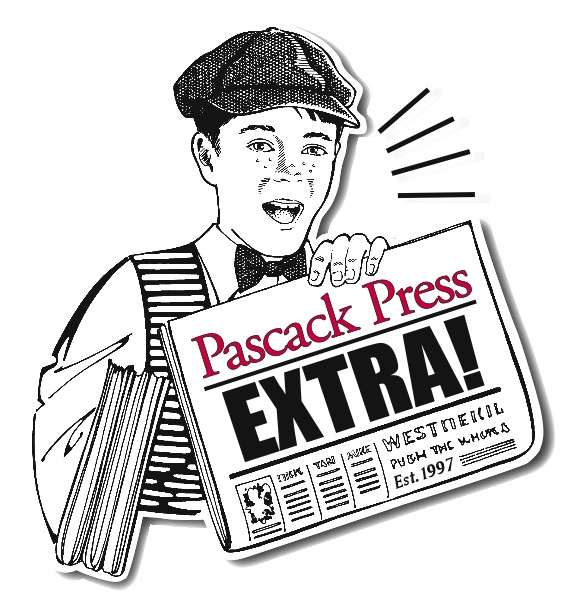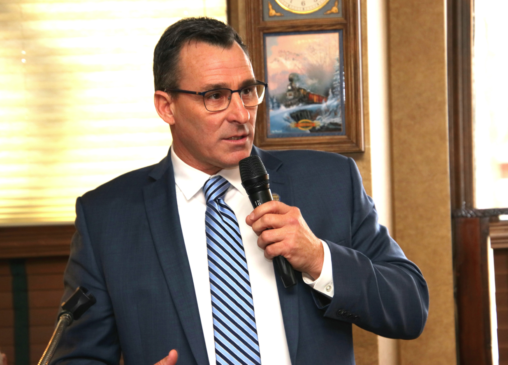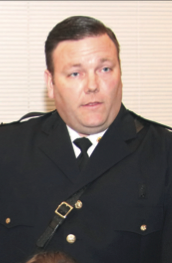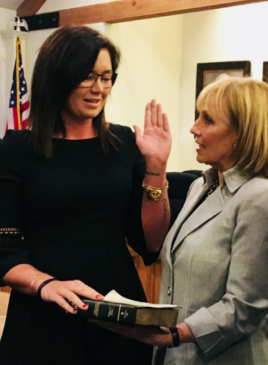
BY JOHN SNYDER
OF PASCACK PRESS
WESTWOOD, N.J.—Executing the third veto of his administration, Westwood Mayor John Birkner Jr. on Sept. 22 negated a nearly unanimous council vote banning both recreational and medical marijuana in the borough, saying the measure was rushed and otherwise negligent.
Reaction, including from Police Chief Michael Pontillo, was sharp.
Birkner filed notice with the borough on Sept. 22, three days after he told Pascack Press he was very likely to do so and four days after the council voted, 5-1, to ban “any establishment involved in the cultivation, distribution, and/or sale of marijuana, either recreational or medicinal” in in all districts, including the hospital.
Birkner is calling for a new ordinance to be introduced that removes the prohibition of medicinal use in accordance with New Jersey’s 2010 Compassionate Use Medical Marijuana Act.
State law says the mayor may veto all or part of an ordinance and the council may override the veto by a vote of two-thirds of the full membership, which is four votes.
The governing body’s next work session is Tuesday, Oct. 2 at 8 p.m. at Borough Hall, 101 Washington Ave. Its next regular public meeting is Oct. 16.

“I am exercising veto authority specific to conditions detailed as inconsistent with the testimony and comments of both the public and members of the Westwood Borough Council,” Birkner said in his filing.
“The Planning Board has been engaged in a responsible and thorough review of the issue of marijuana sales and/or cultivation. This matter has been the first item under discussion for the re-examination of the Municipal Master Plan with time devoted to its review at several meetings. I believe that the Borough Council acted hastily and without consideration of the review being completed,” he said.
Following its review, the Planning Board said tepidly that the ordinance “is not inconsistent” with the Municipal Master Plan.
To Birkner’s point, Council President Chris Montana wrote Sept. 26, “After a review of the [Planning Board] minutes, [Birkner] stating there was ‘responsible and thorough review of the issue’ prior to the introduction of [Councilmember Alyssa] Dawson’s ordinance is weak and a long shot at best.”
He added, “To discuss policy considerations as part of the re-examination of the borough’s master plan—most likely after the state law is passed—does not not benefit or positively serve the residents of Westwood.
“Knowing we can revisit and adjust the ordinance after having reasonable time to review the legislation, identify the challenges and benefits, and confer with public safety and borough professionals in my opinion is a much better option for our community,” he said.
‘No one showed it to me’
Birkner, a Democrat, complained at the ordinance’s passage that it was introduced Aug. 21 “theatrically” and as “a partisan campaign stunt” by Republican councilmembers Dawson and Ray Arroyo with the assistance of Pontillo, who spoke at length to criticize marijuana legalization on several fronts.
“No one ever showed it to me. No one ever showed the attorney […] now all of a sudden there’s a law that you’re going to pass and the attorney doesn’t even know about it? It really raised my eyebrows, to see the Police Department—the chief—come in the same night and give an extended viewpoint. […] The only people who didn’t know about it were the people who should have,” Birkner said Sept. 19.
Police chief calls foul
Pontillo wrote Pascack Press Sept. 27 to say he was “shocked and disappointed” to read in these pages Birkner’s account tying him to the story’s politics.

“Clearly, the marijuana issue is not a partisan one, as both Republican and Democratic controlled towns have both banned marijuana and its sales in the confines of their communities. I have not been contacted by Mayor Birkner at any time about this issue or where my decision was derived from, nor, sadly, has he engaged in any discussion, whatsoever, with me on this issue since I read my position paper into the record in front of the mayor and council,” he said.
He added in part, “It appears that there is a disconnect between personal feelings on the issue and what the State of New Jersey is attempting to do with the legislation. This should not be a local issue that is allowed to be divisive in nature.”
The ban is backed by the Police and Health departments and is in line with a recommendation from the New Jersey State Association of Chiefs of Police.
Pascack Valley Medical Center forwarded Pascack Press a memo via Councilmember Robert Bicocchi, who serves on the hospital’s board, saying that due to the conflict between federal and state law and the current unavailability of well-defined policies, procedures, and processes ensuring the safety of its patients, “PVMC is unable to support local expansion medical marijuana dispensaries.”
Emerson, under Democratic Mayor Louis Lamatina, passed its own comprehensive marijuana ban Aug. 15 by a vote of 5-0. It was introduced June 26
That ordinance worries, “There is no area of the Borough which can safely house a business selling, manufacturing or growing medicinal and/or recreational marijuana and/or the paraphernalia that facilitates the use of such marijuana.”
The Township of Washington, led by Republican Peter Calamari, also passed a single ban on recreational and medicinal marijuana—throwing in bans on vape shops, adult entertainment, and hatchet throwing for good measure—in a nearly unanimous vote July 2.
It went into effect immediately under an “emergency” provision a resident asked be invoked.
Medical marijuana is legal and expanding
Medical marijuana is legal in 30 states, including New Jersey, in the treatment of post-traumatic stress disorder, multiple sclerosis, muscular dystrophy, epilepsy, cancer, major depressive disorder, and musculoskeletal disorders. Additional ailments are being considered.
The New Jersey Compassionate Use Medical Marijuana Act allows New Jersey residents suffering from certain debilitating and life-threatening illnesses to use and possess medical marijuana with a doctor’s recommendation. It was signed by Gov. Jon Corzine on Jan. 18, 2010.
There are six non-profit dispensaries, or alternative treatment centers, statewide, with six more expected Nov. 1. More than 100 new doctors have signed up since the program expansion began in January, with 700 of the 28,000 licensed physicians in New Jersey so far registered to participate.
A separate bill on recreational cannabis sales in the works must pass the state Senate and Assembly before being signed into law, and then the state would need to work out regulations. Legalization is expected to bring in $80 million in annual tax revenue.

Dawson, elected in May to fill the unexpired term of Councilman Emeritus Peter Grefrath, is running with Arroyo against Democratic challengers Jodi Murphy and James Whelan, who said they would support a dispensary at the hospital.
The introduction, which was not on the agenda, caught several off guard, including Birkner, Business Administrator Ben Kezmarsky, and Borough Attorney Russell Huntington, who asked to peruse the document from the dais. He nodded his assent, passing it down the line.
The introduction passed 5-0, with Collins absent. It passed on second read over Collins’s sole “no” vote Sept. 18 after Dawson renewed her claim that time was of the essence to get a ban on the books ahead of anticipated marijuana legalization statewide, a campaign pledge of Gov. Phil Murphy.
Dawson said she found “a Trojan horse” in the draft legislation that would allow nonprofit dispensaries to switch to for-profit retail sales.
She told Pascack Press after the ordinance passed that she is in touch with friends working on the bill who are aware “‘This is big money.’ It’s all about the money.”
She added, “There’s no money in medicinal. It’s all in recreation. I worked in Trenton [on Lt. Gov. Kim Guadagno’s staff]. I know how the Legislature works. It’s a shady, shady crew down there.”
Critics have their say
As word spread, reaction to the veto was sharp from several who wrote letters to the editor and reached out to comment.
Using Birkner’s adjective, Dawson told Pascack Press Sept. 26 she finds his veto to be theatrical, “especially since even he admits it is going to be overturned.”
Among her remarks, she said she has “a problem with the mayor using this public health and safety issue to minimize my ability to govern and serve, when in fact I am the one who caught the ‘Trojan horse’ provision in the draft legislation. I have stood firm in the face of opposition on this issue since I first read the ordinance into the record and I will continue to do so with the best interest of all residents in mind.”
Arroyo told Pascack Press on Sept. 26 that “I really can’t square the mayor’s insistence that Westwood become the hub of regional ‘medicinal’ sales that our hospital has formally disavowed.”
He said towns such as Fort Lee and Paramus “have better infrastructure, including law enforcement infrastructure, to absorb regional marijuana traffic.”
And those towns, he said, “would provide more convenient and accessible retail sales locations than are currently available to the small number of Westwood residents who are licensed to purchase medical marijuana.
No love for recreational sales
Birkner, in his veto, made it clear he opposes recreational marijuana sales.
“With the understanding that marijuana is currently illegal in New Jersey and in most states along with federal designation as a Schedule 1 drug, providing for the allowance of recreational sales and cultivation should not be a permitted use at any such time full legalization should occur.
This was the majority opinion of the Planning Board members as well,” he said.
“However, we had not yet concluded our review of the legal basis to make a blanket restriction given the potential for the state of New Jersey to enact legislation that permits the sale of such products to legal adults along with the expansion of the Compassionate Use Medical Marijuana Act which includes a provision for in home delivery,” he added.
Birkner’s previous vetos were over pay matters in 2013 and a new supervisory position at the Department of Public Works in 2014.
The council overturned his DPW veto at its next meeting.
